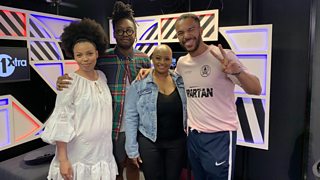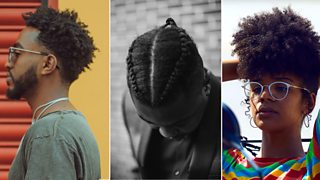Why is black hair so political?
Hair can get pretty personal.
For a lot of people, hair is one of the most important factors of their identity.
And when it comes to black hair, things are often complicated.
From weaves and wigs, to afros, to cornrows and braids - black hair can be a political minefield to understand.
Listen back to 1Xtra Talks

Why is black hair so political? Reece Parkinson and guests discuss.
What's on the agenda?
In July this year, New York joined California as the second state in the US to ban racial discrimination on the basis of natural hair textures. Now there are petitions to bring this law to the UK.
The CROWN Act (Create a Respectful and Open Workplace for Natural Hair) says that European beauty standards have allowed a history of some workplace dress codes banning natural black hair.
But where does this come from? Reece Parkinson joined a panel of guests to explore this on 1Xtra Talks.
Emma Dabiri is a historian, presenter and author of ‘Don’t Touch My Hair’. Christala Fletcher is a professional wig maker and was diagnosed with Alopecia at 10 years old. Kevin Morosky is a director, photographer and the creator of a short series of films called ‘Wool’ exploring black hair.
Here’s what we learned:
The importance of black hair is historic
Emma told us what black hair meant in Pre-Colonial Africa - before the Slave Trade. Afro hair has a very unique texture, and for centuries it has had social significance too.

“Traditionally, complicated braided, twisted and threaded styles would be used to express your status, whether or not you were married and if you went through puberty. It was seen as a really important part of society.”
And the discrimination is historic too
We also found out that the texture of black hair was used as a ‘justification’ for the enslavement of Africans between the 16th to the 19th centuries.
Emma’s research found: “One of the examples of this [justification] was ‘look they don’t even have hair’ - European people have hair. They have wool. Animals have wool. They’re more like livestock.”
“So many of the stereotypes and ideas that we believe about black people were engineered during the Trans-Atlantic Slave Trade.”
Kevin added: “Black and brown people were portrayed as being wild and untamed. And that trickled down to talking about hair.”
Wearing wigs and weaves is a personal choice
When black hair can be so deeply significant, how difficult is it to accept being bald?
"At first there were a lot of tears and unacceptance, trying to find who I was without hair"Christala Fletcher
Growing up with Alopecia, Christala said: “At first there were a lot of tears and unacceptance, trying to find who I was without hair. I felt like I had to appear to the European standards of having hair, which is so unfair.”
Christala started making wigs after she lost all of her hair. She believed there was a ‘detachment’ between the people who make wigs and the people who wear them: “There wasn’t that empathy, there wasn’t that relatability. There was a gap there, and I felt that I was the person to fill that gap.”
Some voices in the black community have argued that wearing a wig is about conforming to a more European or ‘white’ look - but Christala sees hers as an accessory. “It’s something that’s very personal and deep to the person that’s wearing that wig.”
Now she feels comfortable enough to go out without a wig too: “There is no reason why you have to wear a wig if you don’t want to. You can go out completely bald one day and with pink hair the next.”
Touching black hair isn’t okay - here’s why
When Solange said don’t touch my hair, she meant it. Black hair comes in a diverse range of styles, lengths and textures, but touching someone’s hair - especially without permission - can be hugely offensive.
Third party videos may contain adverts
For Kevin, one of the only people who touches his braids is his hairdresser: “My hair is one of my safe spaces. I talk to the woman who re-twists my hair and it’s a ritual. When it gets washed it feels like things are being washed away. Imagine all of that, and then someone just tries to put their hand in your head?”
Emma added: “It’s like a fascination and a weird obsession with blackness. Hair is one of the things that is most different. It’s also got to do with entitlement, this idea that you have access to somebody’s body.”
Subscribe and download the weekly 1Xtra Talks podcast
-
![]()
1Xtra Talks explores open, frank and honest discussions on the subjects that mean most to you - on air Sundays 9 - 10pm.
And available to listen back on Â鶹ÊÓƵAV Sounds
